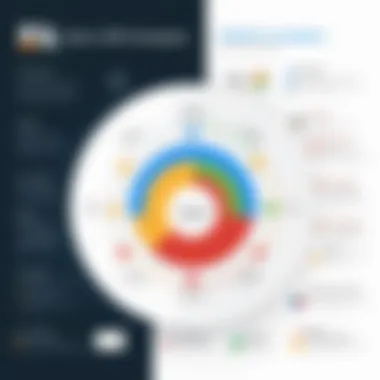In-Depth Analysis of Zoho CRM Software Pricing


Intro
In today's competitive business landscape, effective Customer Relationship Management (CRM) is paramount. Decision-makers, IT professionals, and entrepreneurs continually seek to understand the nuances of CRM software, particularly regarding pricing. This article provides a detailed exploration of Zoho CRM's pricing structure, enabling informed decisions based on specific business needs. We examine various plans, core features, user experiences, and more. The insights gained here aim to facilitate a clearer understanding of how Zoho CRM can align with organizational goals.
Overview of Core Features
Understanding the core features of Zoho CRM is essential for assessing its value. Zoho CRM offers a suite of functionalities designed to streamline customer interactions. Some of the key features include:
- Lead and Contact Management: This feature enables users to manage potential and existing customers efficiently. It includes tracking interactions and information about leads.
- Sales Pipeline Management: Visualize and manage sales processes through customizable sales pipelines.
- Automation: Automate repetitive tasks, saving time and improving accuracy in daily operations.
- Reporting and Analytics: Tools to generate reports and analyze metrics to assess performance and identify areas for improvement.
- Integration Options: Zoho CRM integrates with various third-party applications such as Google Workspace and Microsoft Office.
When comparing these functions against other CRM solutions like Salesforce and HubSpot, it is evident that Zoho CRM provides comparable features but often at a lower cost. This affordability, combined with a robust set of functionalities, makes it an appealing choice for businesses.
User Experience and Interface
User experience (UX) and interface design play critical roles in the successful adoption of any software tool, including Zoho CRM. Here are some insights into the UI/UX aspects of Zoho CRM:
- Intuitive Design: The interface is user-friendly, allowing newcomers to navigate with ease. Customizable dashboards help users access relevant information quickly.
- Mobile Accessibility: The mobile app ensures users can manage their customer interactions on the go.
- Support and Resources: Zoho provides extensive documentation and customer support, enhancing the overall user experience.
Usability and accessibility are fundamental to ensuring that teams can efficiently utilize the software. A smooth onboarding process combined with responsive design fosters greater team engagement, which in turn maximizes the potential benefits of the CRM system.
"A CRM's ability to adapt to a team's workflow can significantly influence its success within an organization."
In summary, this overview of Zoho CRM highlights both its features and user interface. By understanding these aspects, decision-makers can make informed choices regarding CRM software suitable for their unique business needs. The next sections will delve deeper into the pricing structure, including various plans and payments. This detailed assessment will provide valuable insights into the overall value of Zoho CRM in relation to investment.
Overview of Zoho CRM
Understanding the overarching framework of Zoho CRM is essential for any business considering its use. This section provides the foundation needed to appreciate the nuances of its pricing structure and the variety of plans offered. The significance of Zoho CRM lies in its ability to cater to diverse business needs while optimizing customer relationship management across various sectors. An overview enables decision-makers to evaluate not only the software's potential for their organizational goals but also its implications on financial planning related to CRM tools.
Preamble to Zoho CRM
Zoho CRM is a web-based customer relationship management software developed by Zoho Corporation. Since its launch, it has evolved to address the complex demands of modern businesses, providing essential functionalities for sales and marketing processes. The platform stands out due to its flexibility in customization and integration with other applications, making it suitable for businesses of all sizes.
Key aspects that define Zoho CRM include its user-friendly interface, robust reporting features, and automation capabilities. This software is designed to streamline communication with clients, manage sales pipelines, and enhance customer engagement. In essence, understanding Zoho CRM involves recognizing how it supports businesses in understanding their customer behavior and improving sales outcomes.
Key Features of Zoho CRM
When examining Zoho CRM, it is crucial to consider its features that facilitate effective customer relationship management. The software boasts a comprehensive toolkit tailored to meet varying organizational needs. Some notable features include:
- Sales Automation: Helps manage the sales process by automating repetitive tasks, ensuring that sales teams can focus on closing deals rather than administrative duties.
- Lead Management: This allows for better tracking and nurturing of leads, offering insights into potential clients to increase conversion rates.
- Analytics and Reporting: Powerful analytics tools provide valuable insights into sales performance, customer behavior, and market trends.
- Multi-Channel Communication: Supports engagement across email, social media, and phone, providing a holistic view of customer interactions.
- Customization Options: Users can tailor the platform to fit their specific needs, from altering dashboards to modifying reports, thus enhancing usability for different team functions.
The breadth of these features is vital for organizations seeking a CRM solution that can adapt as their business evolves.
"Zoho CRM empowers businesses to harness the full potential of customer data for strategic decision-making."
With this foundation, we can now delve deeper into the pricing model, where the previously discussed features play a crucial role in justifying costs.
Understanding the Pricing Model
Understanding the pricing model of Zoho CRM is essential for organizations considering its adoption. A clear grasp helps in identifying value against investment. Analyzing this model allows decision-makers to align their specific business needs with the features offered by Zoho CRM. Understanding each pricing component and how it correlates to company requirements enhances budgeting and strategic planning. It also allows for informed comparisons with other CRM software solutions.
Components of Zoho CRM Pricing


The pricing structure of Zoho CRM comprises several components that collectively offer flexibility and scalability. The main components include:
- Monthly or Annual Payments: Customers can choose to pay monthly or annually. Annual payment plans might offer cost savings compared to monthly plans.
- User Licenses: The price often varies based on the number of users. More users may lead to volume discounts or increased tiers. Each plan dictates a user limit, affecting costs.
- Features and Functionalities: The core features differ across plans. Basic functionalities are available in lower-tier plans, while advanced features, including automation and analytics, come with higher pricing.
- Customization Options: Businesses may require specific functionalities. Custom features can incur additional costs, impacting the overall budget.
- Add-Ons: Additional integrations or functionalities, such as advanced reporting tools, may be offered at extra charges.
Thoroughly understanding these components enables organizations to assess whether the selected pricing plan accurately meets operational needs.
Tiered Pricing Structure
Zoho CRM utilizes a tiered pricing structure, which offers varying levels of service based on the needs and size of the organization. This is significant for several reasons.
- Scalability: Businesses may start with lower-tier plans and upgrade as they grow. The structure supports different stages of company development and resource allocation.
- Targeted Features: Each tier is designed to cater to specific business segments. For instance, the Free Plan is suitable for startups, while the Enterprise Plan serves larger corporations with complex requirements.
- Cost Control: The tiered pricing model allows businesses to manage expenses closely, ensuring expenditures align with the value received. This flexibility can aid in eliminating unnecessary expenses.
- Trial and Evaluation Potential: Many organizations can assess the lower tiers before committing to higher plans. This reduces the risk of investing in features that may not be utilized effectively.
Pricing Plans Offered by Zoho CRM
Understanding pricing plans is fundamental in assessing the value that Zoho CRM offers to businesses of different sizes and industries. This section delves into the various pricing tiers available, emphasizing how each plan caters to specific customer needs. The multitude of options aims to ensure that organizations can find a suitable fit based on their operational requirements and budget considerations. By evaluating these plans, decision-makers can make educated choices that align with their business growth strategies.
Free Plan
The Free Plan from Zoho CRM is particularly attractive for startups and small businesses that are just beginning to explore customer relationship management tools. This option provides a great entry point, allowing users to manage up to three users with limited features. Key aspects of the Free Plan include:
- User Limit: Designed for small teams, it accommodates a max of three users, which is sufficient for small operations.
- Core Features: While the Free Plan lacks the advanced functionalities of higher tiers, it does include essentials like lead management and basic reporting options.
- No Cost: Being a free solution reduces the economic burden on new businesses. However, users must be aware that this plan has limitations in terms of support and customization.
In essence, the Free Plan presents an opportunity for organizations to familiarize themselves with Zoho CRM without incurring costs, though they may eventually need to upgrade as their requirements grow.
Standard Plan
The Standard Plan caters to small to medium-sized enterprises looking for enhanced features beyond the basics. This plan strikes a balance between affordability and functionality. Notable elements include:
- User Capacity: Supports up to 10 users, making it suitable for small teams seeking to expand.
- Features: Includes features like sales automation, scoring rules, and custom dashboards. These tools can enhance productivity significantly.
- Affordable Pricing: The cost per user remains reasonable, ensuring that even small businesses can leverage powerful CRM capabilities.
This plan is especially beneficial for businesses that require more than basic lead tracking but do not yet need enterprise-level functionalities.
Professional Plan
For teams that require a robust CRM solution, the Professional Plan offers advanced features aimed at maximizing efficiency and generating insights. It is tailored for larger teams with diverse needs. Key characteristics are:
- User Limit: Recommended for teams needing unrestricted access, supporting a larger number of users.
- Advanced Features: Offers functionalities like inventory management, advanced reporting, and integration with third-party applications. Such features are essential for businesses dealing with significant data.
- Customization: Provides options for custom modules and layouts, allowing companies to tailor Zoho to their specific workflow.
This plan is a viable option for companies looking to take their customer engagement strategies to the next level.
Enterprise Plan
The Enterprise Plan is designed for large organizations requiring comprehensive CRM capabilities. This plan encompasses extensive features not found in previous offerings. Important aspects include:
- Scalability: It can accommodate a vast number of users, making it ideal for large teams.
- Complex Features: Includes advanced customization options, multi-user portals, and dedicated customer support, which are crucial for intricate business operations.
- Enhanced Security: Offers in-depth security features, which is a necessity for protecting sensitive customer data.
Organizations invested in significant growth and customer engagement may find this plan to be the most suitable choice.
Ultimate Plan
The Ultimate Plan represents the pinnacle of Zoho CRM’s offerings, providing enterprises with an exhaustive suite of features. This plan is tailored for businesses that require the highest degree of functionality. Significant elements include:


- Maximum Users: Allows for unlimited user access, suitable for very large teams.
- Full Set of Features: Encompasses all features across previous plans and adds features such as advanced analytics and AI-driven data insights.
- Comprehensive Support: Includes priority support and training, ensuring teams can utilize the CRM to its fullest potential.
Comparative Analysis
Understanding the comparative analysis segment of Zoho CRM pricing is essential. It provides insights that allow enterprises to evaluate the value Zoho CRM brings when juxtaposed with its competitors in the CRM space. This comparison helps to illustrate not just price discrepancies but also variations in features, user experience, and customer satisfaction. Evaluating these factors can lead to more informed decision-making.
Comparison with Competitors
When analyzing Zoho CRM alongside competitors like Salesforce, HubSpot, and Microsoft Dynamics, several aspects come into play:
- Pricing: Zoho CRM often offers more budget-friendly options, especially for smaller firms or startups that may not have large budgets for CRM software.
- Features: The extensive feature set of Zoho CRM is comparable to higher-priced competitors. Still, specific functionalities may vary between platforms. For example, Salesforce offers advanced customization abilities that might not be as extensive in Zoho.
- Integration Options: Zoho provides various integrations with other business tools. However, some competitors may offer more seamless integrations with widely-used software.
- User Experience: While Zoho is generally user-friendly, feedback on interface and usability can change across user groups, which often varies in other CRMs.
Identifying how Zoho CRM performs in these categories informs potential buyers about its standing compared to competitors. Such insights can also uncover strengths and weaknesses in pricing strategies, making it vital to a well-rounded assessment.
Value Proposition of Zoho CRM
The value proposition of Zoho CRM distinguishes itself in several key areas:
- Cost-Effectiveness: Zoho CRM stands out for providing robust solutions at a lower price point. Many businesses find they receive substantial features for their investment, particularly when compared to more expensive alternatives.
- Customization: Clients have the ability to tailor the software to fit their specific needs. This level of customization can enhance operational efficiency and cater to unique business models, offering excellent value for price.
- Scalability: As businesses grow, having a CRM that can scale with them is critical. Zoho offers plans that can grow with the company, maintaining high value as needs evolve.
- Customer Support: Users frequently report positive experiences with Zoho’s support services. This level of attention can translate into a better overall experience and justify costs incurred.
- Comprehensive Features: With elements like automation, reporting, and analytics, users have access to a full suite of tools that can enhance their sales and marketing functions.
In essence, the intrinsic value of Zoho CRM should be evaluated through these lenses, making it a viable contender in the competitive CRM marketplace. The analysis of such elements brings clarity to the overall effectiveness of investment in Zoho CRM.
Customization and Add-Ons
Customization and add-ons are critical factors for businesses considering Zoho CRM. These elements not only enhance the core functionality of the software but also ensure that it aligns closely with specific organizational workflows. As no two businesses are identical, the ability to tailor the CRM to meet unique requirements can significantly improve user experience and productivity. In this section, we will examine not only what customization options are available but also the implications of implementing these features.
Additional Charges for Custom Features
Zoho CRM offers various customization features which allow businesses to personalize their systems. Custom fields, modules, and workflows can be designed to fit specific operational needs. However, it is important to note that many of these enhancements can incur additional charges.
- Custom Modules: Creating unique modules tailored to specific business tasks often involves extra costs. This can be advantageous for users, as it streamlines processes but comes at a price.
- Integrations: Adding third-party integrations can enhance Zoho CRM’s functionality. Businesses may have to pay for each integration they wish to incorporate.
- User Training: With customization comes the need for training to ensure employees understand the new system. This training can be an additional expense that businesses need to factor into their budgeting.
Impact of Add-Ons on Total Costs
Add-ons can positively or negatively impact the overall cost of utilizing Zoho CRM. These tools often help organizations in improving productivity but can also add complexity to pricing structures.
- Types of Add-Ons: Various add-ons are available, such as advanced reporting or analytics tools, which can lead to better insights into customer interactions. Organizations must assess which add-ons are truly beneficial to justify the additional costs.
- Budgeting for Add-Ons: It is vital for decision-makers to carefully review the potential total costs associated with all desired add-ons before committing. Adding several features can elevate monthly or yearly expenditures significantly.
- Long-Term Value: While the upfront cost of customization and add-ons may seem high, organizations might find that the improved efficiency and effectiveness of the CRM provides a high return on investment over time.
"Understanding the implications of customization and add-ons can turn Zoho CRM from a basic tool into a powerhouse for business efficiency."
Free Trials and Discounts
In the realm of software subscriptions, understanding the role of free trials and discounts is crucial for those considering an investment in Zoho CRM. These offers can provide significant value, allowing potential customers to experience the functionality of the software before committing financially. This section outlines how free trials and promotional discounts can influence decision-making and what aspects one should consider when using these opportunities.
Trial Period Insights
A trial period is an opportunity for users to explore the full capabilities of Zoho CRM without any financial commitment. Usually lasting from 14 to 30 days, the trial enables organizations to assess whether the features align with their operational needs.
During this phase, users can not only test core functionalities but also evaluate the user interface, integration capabilities, and overall performance. It's recommended to engage with the support and educational resources provided by Zoho to make the most of this period. Users should consider:
- Identifying Key Features: Determine which features are essential for your team. For instance, sales automation and lead management are critical for many businesses.
- Assessing Usability: Evaluate how intuitive the software is for your team. A user-friendly interface can significantly enhance adoption rates.
- Testing Integration: Ensure it integrates well with currently used systems. Compatibility can save time and resources in the long run.


In summary, taking full advantage of the trial ensures informed decisions, based on practical experience rather than mere speculation.
Promotional Offers and Discounts
Promotional offers and discounts can significantly reduce the overall costs associated with Zoho CRM. Such offers may include seasonal discounts, special pricing for non-profits, or bundled options that integrate multiple service features. Each of these promotions can affect the bottom line, making the software more accessible to various business sizes.
When considering these offers, keep in mind:
- Types of Discounts: Discounts may vary based on the plan or service. For example, subscribing on an annual basis often results in significant savings compared to monthly payments.
- Limited-Time Offers: Vendors may run limited-time promotions. These offers can include additional features at no extra cost or reduced fees for the first few months.
- Eligibility for Discounts: Certain groups like startups, non-profits, or educational institutions may be eligible for unique discounts, making it worth inquiring about available programs.
Remember: Timing can be critical. Monitoring expected promotional periods or special events could optimize your purchasing decision.
User Experiences and Feedback
User experiences and feedback are invaluable when evaluating any software, including Zoho CRM. They provide insights into real-world applications and help potential users understand how the software performs against expectations. This section addresses the significance of user feedback as critical components of decision-making for IT professionals and entrepreneurs.
Understanding user experiences offers multiple benefits. First, they highlight both strengths and weaknesses of the software from the perspective of those who have actively engaged with it. For example, many users appreciate the intuitive interface of Zoho CRM which facilitates ease of use, while some might express concerns about specific limitations related to customization options.
Moreover, feedback reveals how various features of Zoho CRM can impact business processes. Users often share their experiences regarding integrations with existing systems, speed of deployment, and customer support responsiveness. These insights can aid prospective buyers in weighing their options and expectations when considering Zoho CRM for their organizations.
It is essential for decision-makers to review user feedback, as it provides tangible evidence of both the software’s performance and its adaptability to diverse business needs.
While it is important to consider user reviews, one must also be aware of potential bias in testimonials. It is beneficial to analyze trends among reviews rather than relying solely on individual opinions. This helps distill a more comprehensive understanding of the product’s capabilities and limitations.
Customer Testimonials
Customer testimonials serve as a direct line to the experiences of those who have utilized Zoho CRM. These testimonials can be a mixture of positive and negative feedback, affording potential users a well-rounded perspective.
Many customers commend Zoho CRM for its affordability, especially in comparison to other CRM solutions in the market. Users frequently highlight features such as lead management and reporting tools, which they find particularly effective. The platform's ability to adjust and scale according to business size and requirements is often praised as a hallmark of its flexibility.
On the contrary, some customers mention challenges they faced. These may include a steep learning curve for new users or occasional performance issues during peak usage. Such insights can be critical for potential users to understand what adjustments may be necessary to fully leverage the software.
Expert Reviews
Expert reviews offer a contextual analysis of Zoho CRM, often assessing it against industry standards and best practices. These reviews are crucial for decision-makers who seek to understand the software's position in the CRM landscape.
Experts typically appreciate Zoho CRM’s robust functionality and variety of tools that cater to different business processes. They analyze the tiered pricing structure, exploring how each plan aligns with the targeted customer base. Furthermore, experts often evaluate user experiences over a wider scope, confirming trends found in consumer testimonials.
Some experts highlight potential pitfalls as well. For example, they might discuss the limitations of the free plan or point out areas where Zoho CRM could enhance user experience. Such critical evaluations can empower businesses to make more informed decisions.
Ultimately, both customer testimonials and expert reviews form the backbone of user feedback. By assimilating these perspectives, potential users of Zoho CRM can identify its true value and make judicious investments aligned with their business objectives.
Ending
In the landscape of customer relationship management, the pricing of Zoho CRM plays a crucial role in shaping the decisions of potential users. Understanding this aspect can provide insights into the overall value of the software. It is essential for decision-makers to grasp the variety of plans available, as well as the features associated with each tier. This enables organizations to match the CRM functionalities with their unique requirements, ensuring that they invest in a solution that can cater to their operational needs effectively.
Final Thoughts on Zoho CRM Pricing
The various pricing tiers offered by Zoho CRM reflect a strategic approach to cater to a diverse clientele. Each plan, from the Free Plan to the Ultimate Plan, is designed to address specific business needs at different scales. This flexibility allows organizations of various sizes and budget constraints to consider Zoho CRM as a viable option. Moreover, complexities such as customization and add-ons can impact the total cost. Thus, it is prudent for users to thoroughly analyze these costs in relation to their expected return on investment. Being informed of how each pricing plan aligns with company needs can lead to better decision-making, ultimately boosting productivity and customer satisfaction.
Guidance for Decision-Makers
For decision-makers, the critical takeaway is the necessity to conduct a thorough evaluation of their requirements before selecting a CRM solution. Key considerations include:
- Assessing Business Needs: Identify which features are essential for your organization. For example, small teams may find the Free Plan sufficient, while larger enterprises may require the robust capabilities of the Enterprise Plan.
- Evaluating Total Cost of Ownership: Not just the base price of the plans, but also how customization and add-ons can elevate costs.
- Utilizing Free Trials: Taking advantage of free trials to explore the software in practical scenarios can inform better decisions.
- Researching User Feedback: Looking into customer testimonials and expert reviews can provide real-world insights into the software's performance and support.
By taking a methodical approach to evaluating Zoho CRM’s pricing, and aligning it with strategic goals, organizations can make informed decisions that enhance customer relationships and drive business growth.



